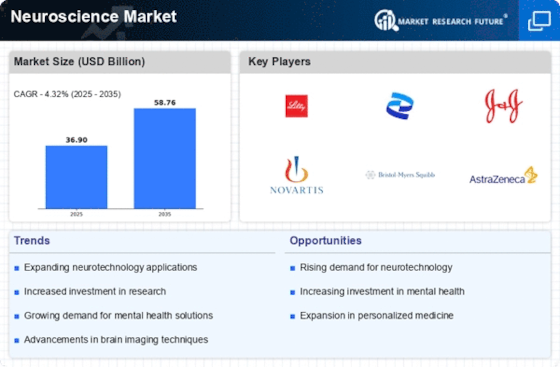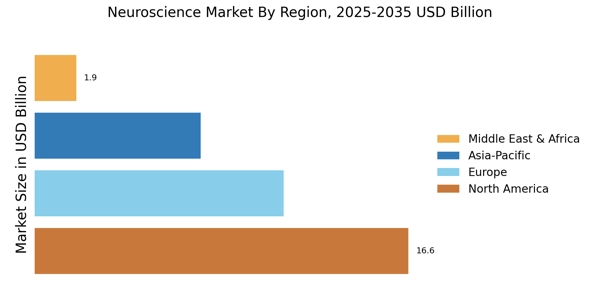Growing Awareness of Mental Health
The Neuroscience Market is increasingly shaped by the growing awareness of mental health issues and their impact on overall well-being. As society becomes more attuned to the importance of mental health, there is a corresponding rise in demand for effective treatments and interventions. This trend is reflected in the increasing allocation of resources towards mental health research, with funding for neuroscience initiatives focusing on conditions such as depression, anxiety, and PTSD. By 2025, it is anticipated that mental health-related expenditures will surpass 200 billion dollars, highlighting the urgent need for innovative solutions within the Neuroscience Market. Furthermore, public campaigns aimed at destigmatizing mental health issues are likely to foster greater acceptance and encourage individuals to seek help, thereby driving demand for neuroscience-based therapies and support systems.
Technological Advancements in Neuroscience
The Neuroscience Market is being transformed by rapid technological advancements that enhance research capabilities and therapeutic options. Innovations in neuroimaging techniques, such as functional MRI and PET scans, are providing unprecedented insights into brain activity and structure. These technologies are not only facilitating better diagnosis but also enabling the development of targeted therapies. In 2025, the market for neuroimaging is projected to reach 10 billion dollars, reflecting the growing reliance on advanced imaging techniques in both clinical and research settings. Additionally, the emergence of neurostimulation devices, such as transcranial magnetic stimulation, is revolutionizing treatment paradigms for various neurological and psychiatric disorders. As these technologies continue to evolve, they are likely to play a pivotal role in shaping the future of the Neuroscience Market, offering new avenues for intervention and improving patient care.
Rising Prevalence of Neurological Disorders
The Neuroscience Market is significantly influenced by the increasing prevalence of neurological disorders, such as Alzheimer's disease, Parkinson's disease, and multiple sclerosis. As populations age, the incidence of these conditions is expected to rise, creating a pressing demand for effective treatments and interventions. Current estimates suggest that by 2025, the number of individuals affected by Alzheimer's alone could reach 50 million worldwide. This alarming trend is prompting healthcare systems to prioritize research and development in the Neuroscience Market, as the economic burden of these disorders is substantial. The need for innovative solutions is further underscored by the growing awareness of mental health issues, which are often intertwined with neurological conditions. Consequently, the industry is likely to witness a robust expansion as stakeholders seek to address these challenges through novel therapeutic approaches.
Increased Investment in Neuroscience Research
The Neuroscience Market is experiencing a surge in investment, driven by both public and private sectors. Funding for neuroscience research has seen a notable increase, with government agencies allocating substantial budgets to explore neurological disorders and cognitive functions. In 2025, it is estimated that research funding will exceed 50 billion dollars, reflecting a growing recognition of the importance of understanding the brain. This influx of capital is likely to accelerate the development of innovative therapies and technologies, thereby enhancing the overall landscape of the Neuroscience Market. Furthermore, collaborations between academic institutions and pharmaceutical companies are becoming more prevalent, fostering an environment conducive to groundbreaking discoveries. As a result, the industry is poised for significant advancements, potentially leading to new treatment modalities and improved patient outcomes.
Regulatory Support for Neuroscience Innovations
The Neuroscience Market is benefiting from enhanced regulatory support aimed at fostering innovation and expediting the approval of new therapies. Regulatory agencies are increasingly recognizing the need for streamlined processes that facilitate the introduction of groundbreaking treatments for neurological and psychiatric disorders. In 2025, it is expected that new regulatory frameworks will be established to support the development of neurotechnologies and therapies, potentially reducing the time to market for innovative solutions. This supportive environment is likely to encourage investment in the Neuroscience Market, as companies seek to capitalize on the favorable regulatory landscape. Moreover, collaboration between regulatory bodies and industry stakeholders is anticipated to enhance the overall quality and safety of new products, ultimately benefiting patients and healthcare providers alike.

















